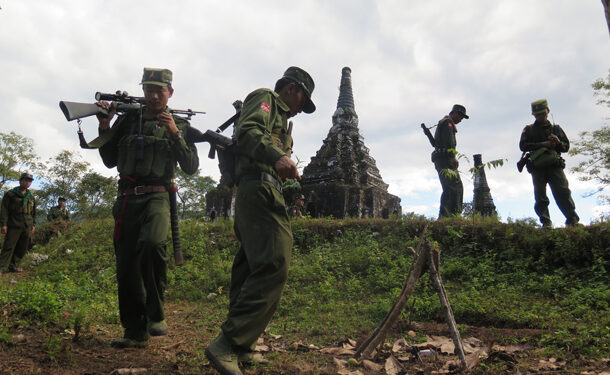RANGOON — The Burma Army has threatened renewed military offensives if the Shan State Progress Party/Shan State Army-North (SSPP/SSA-N) refuses to withdraw from two mountain posts bordering ethnic Wa territory, according to local sources.
A sergeant from the SSA-N told The Irrawaddy on the condition of anonymity that his armed group would not abandon these northern Shan State posts and that they would defend their territory in the event of a strike by government forces.
“We have two brigades there,” the officer said. “We have no conditions under which we would withdraw from our posts because this was our area and we have been based here for a long time. We are prepared to fight if they take action.”
The warning to withdraw came in the form of a letter from the Burma Army’s Northeastern Command in Shan State’s northern city of Lashio, just before the annual water festival last week, the sergeant said.
He expressed concern that the Burma Army might be planning an operation on a larger scale.
“We are even worried about whether they will attack our other bases, not only these two mountain posts,” he added.
The two small bases in question straddle territory controlled by the United Wa State Army (UWSA), and are located in the Loi Lan and Loi Say hills near the Salween River in Tanyang Township. The location is a half-day’s travel from the SSPP/SSA-N headquarters in central Shan State’s Wan Hai, and has been scouted as a potential location for a larger Shan base.
The area is strategic for both the SSA-N—thought to be an ally of the Wa army—and the Burma Army, who, some speculate, would prefer to defeat the UWSA, Burma’s largest ethnic armed organization.
It is not the first time that the Burma Army has demanded that the SSPP/SSA-N withdraw from their posts or face an offensive from government forces. The last attack against the Shan armed group began under similar circumstances just two days after the nationwide election held in November 2015, when the military called for a retreat of the SSA-N from posts outside of Wan Hai. Fighting continued for months, displacing thousands of villagers in central Shan State.
Citing a lack of inclusivity, the SSPP/SSA-N opted out of becoming a signatory to Burma’s so-called nationwide ceasefire agreement (NCA), signed by the previous government and eight of the country’s more than 20 ethnic armed groups last October.
As a new National League for Democracy-led (NLD) administration finds its bearings, ethnic armed leaders expect that a new round of peace talks will begin soon.
“We are waiting to see how much the military will cooperate with the new government while the new government is calling for peace and reconciliation,” the SSPP/SSA-N’s Col Pein Pa told The Irrawaddy earlier this month.
The Burma Army has continued to fight other NCA non-signatory groups, including the Kachin Independence Army (KIA) near Laiza in nearby Kachin State, allegedly seizing three of the KIA’s mountain posts, according to recent reports by the local Kachin News Group.
Another large offensive has been launched in Shan State by government forces against the ethnic Ta’ang National Liberation Army (TNLA). Since March, clashes have occurred in Namkham, Namhsan, Kutkai and Kyaukme townships. Ethnic Palaung (Ta’ang) rights groups have reported arbitrary detainment of locals, as well as torture and forced portering in areas where the Burma Army is active. According to a statement issued by the TNLA, four Burma Army infantry divisions withdrew from the region before the mid-April water festival.

















